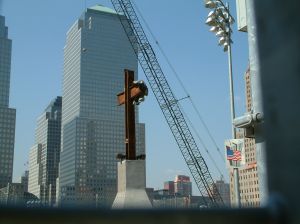On 9/11
There must be a time of day when the man who
makes plans forgets his plans,
and acts as if he has no plans at all.There must be a time of day when the man who has
to speak falls very silent.
And his mind forms no more propositions,
and he asks himself:
Did they have a meaning?There must be a time
when the man of prayer goes to pray
as if it were the first time in his life
he had ever prayed,
when the man of resolutions puts his
resolutions aside
as if they had all been broken,
and he learns a different wisdom:distinguishing the sun from the moon,
the stars from the darkness,
the sea from the dry land,
and the night sky from the shoulder of a hill.
–Thomas Merton, No Man is an Island, as quoted in A Book of Hours
This poem seems strangely appropriate today on the tenth anniversary of 9/11. It’s a poem about stepping out of our tyrannizing routines and reflecting. That’s what we’re doing today as a nation. That’s what the original event forced us all to do. Many a person fell silent, many a person prayed as if we’d never prayed before, many of us asked: did our propositions mean anything?
The end of the poem suggests a series of finer and finer distinctions that can be made. Sun from moon is easy enough, but the night sky from the shoulder of a hill? It takes great clarity of vision to be able to discern that line. We like to think that ten years after the fact, we may understand some things more clearly. What’s really important? What remains, after everything that can be shaken is shaken? What have we gained and lost since this day ten years ago?
I can’t answer all these questions, even now. I didn’t lose anyone I knew on 9/11. But I remember that morning. I remember my husband calling from work and giving me the news; I remember how I didn’t grasp it until I turned on the television; I remember how Peter Jennings, now gone, didn’t even register the towers collapsing before our eyes. I remember that I was alone, glued to the t.v. all day, except for my 6-month-old daughter in her jolly jumper. I would look from her to the screen and back. I grabbed a notebook, certain I wanted to write something for her, but all I got down was, “The world you will grow up in changed today.”
I remember this, too, though it shames me now: I saw the towers go down and because of the resemblance to the tower of Babel, I initially read the tragedy as God’s judgment on our nation. This is one sun vs. moon distinction I see now, and I can’t believe I didn’t see it then: the distinction between God’s righteous action and human evil. The terrorist acts of 9/11 were unmitigated evil, nothing more. God, who loves us radically enough to put his own flesh and blood on the altar as a shield against the annihilation we would surely face when our sinfulness collides with his holiness, is not the perpetrator of an atrocity like 9/11.
Today we are not at church because of another tragedy, a flood that has closed down the town and made the roads almost completely impassable. We can’t get there without violating the order to stay off the roads unless it’s absolutely necessary. But church is happening just the same. It’s happening here at home, where we’ll read and reflect and pray together. And it’s happening at the church, where 40 homeless people are being sheltered and fed. God didn’t smite the town with flood any more than he smote the country with terrorist bombs 10 years ago. But he is here to comfort and restore, to remain the sure foundation in time of trouble, to be the stable reality and the source of peace that passes understanding. I’ve come to understand this more deeply over the last ten years. May the next ten years drive it home even more truly.





3 Comments
Ruth
Great post.
Barbara H.
I can understand the judgment issue because there were times in Scripture God did send calamitous events to wake nations up to their sin, and our nation in general seems to be going further away from God rather than closer to Him. But I was miffed at those who at the time pronounced the events as God’s judgment for particular sins — I think one mentioned abortion, as if the people in the two towers were responsible for the nation’s abortions.
So even though things like this might cause me to wonder at the possibility of God’s judgment, I can only leave that to Him, and I think the better view is what you described, man’s inhumanity (to put it lightly) against man.
Janet
I have a hard time reconciling “God is patient, not wanting anyone to perish, but everyone to come to repentance” with the idea that he continues to judge nations like he did in the Old Testament. This suggests that he withholds judgment till the end, which he delays out of grace.
My understanding of his judgment gets mixed with the idea of his anger toward sin, too, which is a different thing than measured judgment — and which was spent at the cross, as I understand it. I can see how a nation experiences the consequences of deliberately going against God’s instructions, but this seems different from experiencing his active judgment.
Or do I swing too far the other way from my 2001 frame of mind? I’m definitely “in process” when it comes to understanding God’s ways.